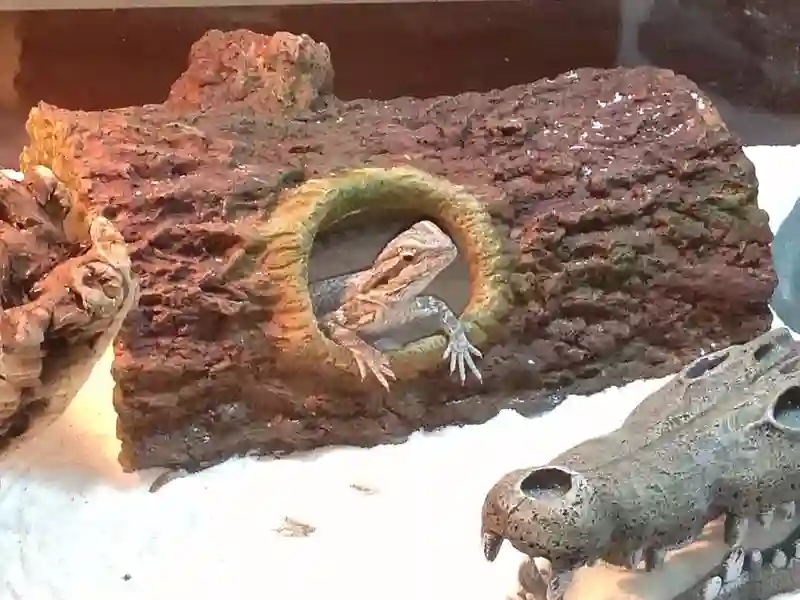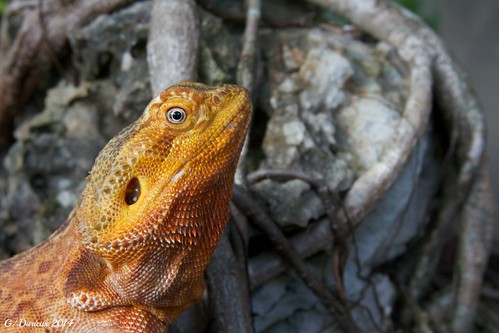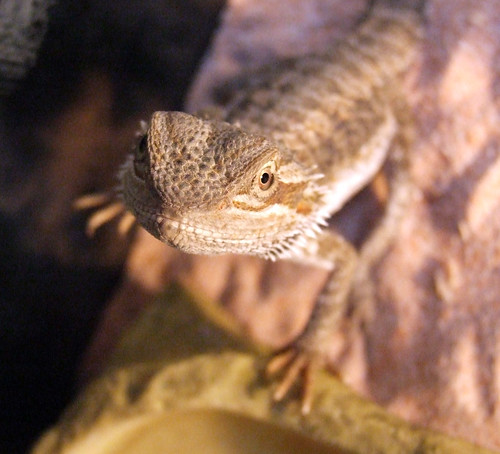Unhealthy bearded dragon eyes can manifest in various ways, and it’s essential to recognize the signs to provide proper care and treatment. Some common indicators of unhealthy bearded dragon eyes include:
- Eye discharge or crusting: Eye discharge or crusting around the eyes can be a sign of an eye infection.
- Puffy, bulging, or swollen eyes: If your bearded dragon’s eyes appear puffy, bulging, or swollen, it could indicate an underlying health issue. This can sometimes be associated with shedding, in which case it may self-resolve.
- Watery or cloudy eyes: Watery or cloudy eyes can be a sign of eye infections, parasites, irritation, or trauma.
- Sunken eyes: Sunken eyes may be the result of dehydration or a possible infection.
- Dull or dark eyes: Unhealthy bearded dragons may have dull or dark eyes, which could be related to a shedding issue or other health problems.
- Difficulty opening eyes: If your bearded dragon is unable or refusing to open its eyes, it may be suffering from an eye infection or other health issues.
Let’s explain the sickness of bearded dragon eyes in more detail:
Bearded Dragon Eyes
Bearded dragon eyes are fascinating. Unlike humans, these reptiles have elliptical pupils, providing them a wide field of vision. Their eyes also depict their mood and health status, thereby becoming an essential focus for pet owners.
Maintaining the eye health of your bearded dragon is crucial. Eye problems can indicate more serious underlying health issues and, if left untreated, could potentially lead to blindness.
Signs of Unhealthy Bearded Dragon Eyes
A clear or cloudy discharge around the eyes is one of the first signs of unhealthy eyes in bearded dragons. If you notice this, it could be due to an eye infection or some other health concern.
Swelling
Swollen eyes can indicate various issues, such as an infection, injury, or an adverse reaction to a substance within their enclosure.
Closed Eyes
While it’s normal for bearded dragons to close their eyes occasionally, persistent eye-closing is a cause for concern. It could signal discomfort or a more serious health issue.
Discoloration
A change in your bearded dragon’s eye color can signify health problems. If the eyes appear cloudy or have a change in their natural color, it may signal an infection or illness.
Common Eye Issues in Bearded Dragons
Conjunctivitis, or pink eye, is a common problem in bearded dragons. It causes red, swollen, and watery eyes and can be a result of poor hygiene, bacterial infection, or a foreign object in the eye.
Eye infections are usually caused by bacteria and can cause redness, swelling, and discharge. Immediate medical attention is necessary to prevent further complications.
Shedding issues can cause eye problems in bearded dragons. If shed skin gets stuck around the eyes, it can cause discomfort and potentially lead to infections.
Bearded Dragon Droopy Eyes
Dehydration can cause droopy, sunken eyes in bearded dragons. If your bearded dragon isn’t getting enough water or is losing too much (e.g. due to diarrhea), it may become dehydrated. This can usually be rectified by offering more water, either through a dish, misting, or soaking the dragon in lukewarm water.
Bearded dragons, like other reptiles, can suffer from kidney disease. This can result in a variety of symptoms, including droopy or sunken eyes. Kidney disease can be serious and will require a vet’s attention.
This can cause a variety of eye problems in bearded dragons, including droopy eyes and eye crust. It’s important to provide a varied diet to your bearded dragon, and sometimes a vitamin supplement, to prevent deficiencies.
Bearded Dragon Parasites
Parasites, especially internal ones, can cause a variety of health problems in bearded dragons, including eye problems. If you suspect your dragon has parasites, a vet can diagnose and treat this.
Eye crust is often a sign of an eye infection, which may be bacterial, viral, or fungal. This will need to be diagnosed and treated by a vet.
This can also be a sign of an infection or potentially an issue with the bearded dragon’s tear ducts.
Preventing Eye Health Issues
Creating a proper habitat for your bearded dragon can help prevent many health issues, including eye problems. This includes maintaining proper temperature and humidity levels and ensuring a clean and hygienic environment.
A balanced diet is crucial for maintaining a bearded dragon’s overall health, including eye health. Vitamins A and C are particularly important for maintaining good vision.
Regular check-ups with a vet who specializes in reptiles can help catch any potential health issues, including eye problems, early.
When to See a Vet?
If you notice any unusual signs related to your bearded dragon’s eyes, it’s best to seek advice from a vet immediately. Prolonged issues can cause permanent damage and seriously affect the health and quality of life of your pet.
FAQs
Why is my bearded dragon’s eye swollen?
It could be due to an infection, injury, or a reaction to a substance within their enclosure.
Why are my bearded dragon’s eyes closed all the time?
Persistent eye-closing could indicate discomfort or a more serious health issue.
What causes conjunctivitis in bearded dragons?
Poor hygiene, bacterial infection, or a foreign object in the eye can cause conjunctivitis.
How can I prevent eye problems in my bearded dragon?
Maintain a proper habitat, provide a balanced diet, and schedule regular vet check-ups.
What does a change in my bearded dragon’s eye color mean?
A change in eye color could signal an infection or other health problem.



